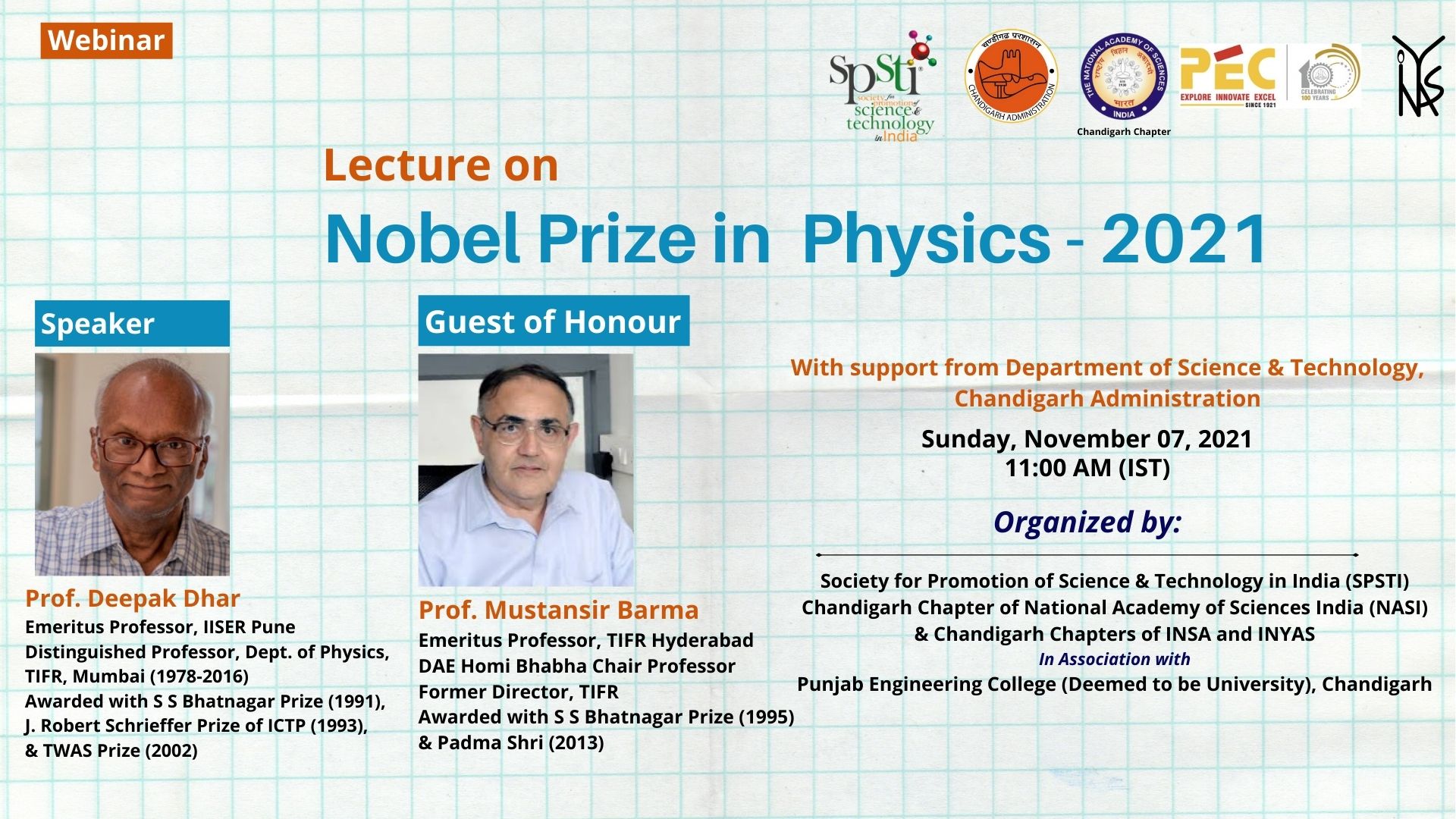Equation of Physics and Equilibrium of Climate Explained
The second lecture in the Nobel Prize 2021 series, initiated by the Society for Promotion of Science & Technology in India (SPSTI) was held online on 7th November, the birthday of the lone Indian Nobel Laureate in Science, Bharat Ratna Sir C. V. Raman. The speaker was Prof. Deepak Dhar, a renowned Physicist from TIFR, now teaching in IISER Pune. The series of lectures is supported by the Department of Science and Technology, Chandigarh Administration and is held in association with Chandigarh Chapters of National Academy of Sciences India, Indian National Science Academy & Indian National Young Academy of Sciences and Punjab Engineering College (PEC), Chandigarh. This series will be concluded on 9th Dec. The day before the prizes are to be ceremoniously awarded in Stockholm. Interestingly, the organizers have decided to hold three webinars on the same prize, i.e, Physics!
This year’s Prize in Physics is to be jointly awarded to Giorgio Parisi, Sapienza University, Rome, Italy “for the discovery of the interplay of disorder and fluctuations in physical systems from atomic to planetary scales” who gets one half of the prize and Syukuro Manabe, Princeton University, USA and Klaus Hasselman, Max Planck Institute for Metrology, Hambrug, Germany “for the physical modeling of Earth’s climate, quantifying variability and reliably predicting global warming” (who share the other half). The name and some of the work of Parisi being familiar to Physicist working in areas connected with Statistical Mechanics (one of the standard core subjects in any Physics curriculum), Prof. Dhar was quickly contacted and agreed to speak, but only on some aspects of Parisi’s work! Another speaker would be Prof. Karmakar from IIT Gauhati who has worked with the Nobel Laureate himself. The third lecture, on climate model, will be delivered by Prof. B.N. Goswamy of Cotton College, Guwahati.
The guest of honor, Padma Shri Prof. Mustansir Barma, Emeritus Professor, TIFR Hyderabad, DAE Homi Bhabha Chair Professor, Former Director, TIFR, and a Bhatnagar Prize awardee, talked briefly about C.V. Raman and his dedication for his work.
Prof. Deepak Dhar, Emeritus Professor, IISER Pune, distinguished Professor of Physics, TIFR Mumbai (1978-2016) and recipient of Bhatnagar Prize (1991) as well as many other awards, in his lecture, explained the arrangement of atoms in the class of solids called amorphous (disordered)as compared to the other class, the crystalline solids. Glasses, which belong to the former class, in spite of their atoms having thermal motion, have a network of nearest neighbor atoms with connections which are nearly static. He also spoke about systems of spin where freezing into random looking configuration occurs and is reminiscent of atomic freezing in glasses. He explained the equations describing these systems. He further spoke about broken ergodicity and replica symmetry breaking where even two identical copies of the system do not remain in same thermodynamic state. This made significant contributions in terms of systematic applications of the replica method to disordered systems, even though the replica method was originally discovered by Sir Sam Edwards in 1971. Parisi wrote his first paper on the subject in 1979 titled ‘Infinite number of order parameters for spin-glasses’, but it took many years for scientific community to understand. Explaining Kardar-Parisi Equation he said Parisi’s deep insight helped in understanding the behavior of spin glasses
Parisi’s work on climate variation is by way of understanding it as a phenomenon of stochastic resonance, the work he published with Benzi, Vulpani and Sutera in 1982. His work helped in understanding 100,000 years cycle of temperature variation by studying the structure of frozen ice at North Pole. An extremely versatile Physicist, Parisi’s work has also contribute a lot to understanding of particle physics and earth science and has led to better understanding of complexity measures in computer science. It even finds applications in biology, such as protein folding.
The lecture was followed by a lively discussion which veered towards climate change and the activism required by societies such as SPSTI to bring about awareness leading to meaningful actions.
Also present on the occasion were Prof. Keya Dharamvir, General Secretary, SPSTI, Prof. Arun K. Grover, former Vice Chancellor of Panjab University & Vice President of SPSTI, Dr. Sugandha Maheshwary and Dr. Rohit Sharma, members of INYAS, as well as Prof. Anand Bachhawat, IISER Mohali representing INSA. The lecture was attended by 135 on Zoom and many others through live streams of the Society. The concluding remarks were made by Shri Dharam Vir, IAS (Retd.) and former Chief Secretary of Haryana and President of SPSTI.

